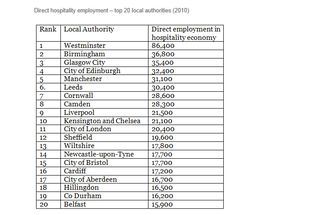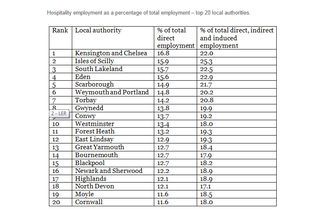British Hospitality industry can create 475,000 jobs by 2020, but barriers to growth need to be removed


The hospitality industry can create 475,000 jobs by 2020 if barriers to growth are removed, says a new report by Oxford Economics, Hospitality: Driving Local Economies, commissioned by the British Hospitality Association, which is being distributed to every MP, MEP, MSP and Welsh Assembly member.
The report, which identifies the hospitality industry's contribution to each of the 406 local authorities throughout the country, says that the hospitality industry directly employs 2.4m people and contributes over £46 bn in wages and profits (Gross Value Added†) to local economies every year, but the high rate of VAT on accommodation and attractions makes UK tourism uncompetitive with the rest of Europe.
While Westminster has the highest number of hospitality jobs of all local authority areas in the country (86,000), and is easily the biggest in terms of wages and profits (GVA) (£2.4bn) the Isles of Scilly and areas in Cumbria and in the south-west are the local authorities most dependent on the success of the hospitality industry and on the tourism industry generally.
Almost two in every ten employees in Kensington and Chelsea work in hospitality (16.8 per cent), but the percentage is almost as high in the Isles of Scilly (15.9 per cent), South Lakeland (15.7 per cent), Eden (15.6 per cent) and Scarborough (14.9 per cent).
Taking direct, indirect and induced employment* and GVA into account, over quarter of all employees in the Isles of Scilly are dependent on the hospitality industry (25.3 per cent) and they contribute almost 40 per cent to the islands' GVA (39.3 per cent).
"These figures show how dependent many local authority areas are on the hospitality industry," says Ufi Ibrahim, chief executive of the BHA.
"It is a key contributor to every local authority's economic livelihood and particularly to its job-creating and wealth-creating potential. The industry should be seen as an essential part of every local plan."
But she warned that Britain's lack of price competitiveness with other major European countries represented a major hurdle. According to the World Economic Forum's latest Travel and Tourism Competitiveness Index, the UK ranked 135th out of 139 countries on price competitiveness.
"Growing the hospitality economy depends on improving this position so that the whole UK economy can benefit," she said.
"All but two EU member states have reduced the rate of VAT on accommodation and attractions. They recognise that the direct revenues foregone as a result of the reduced rate concession are compensated by the additional demand that reduced rates generate, and the creation of new jobs.
"We believe that the industry can create 236,000 jobs by 2015 and a total of 425,000 by 2020, providing we have the right level of government support in place."
In an eight-point Growth Agenda, the report cites visa controls and costs and Air Passenger Duty as other inhibiting factors, while it urges the newly established Local Enterprise Partnerships to recognise the significance of the industry to their economic and social prosperity locally.
"The challenge now is to make sure that the national and local government to provide the right framework in which the industry can grow and create more jobs.
"We want all politicians to recognise and support the industry as it continues to create jobs, deliver growth and helps to re-balance the UK economy."
Cllr Chris White, Chair of the Local Government Association's Culture, Tourism and Sport Board, said the UK was a nation full of unique attractions and destinations, each grounded in local communities.
"Some are linked to modern culture such as huge entertainment venues or a vibrant nightlife, others to tradition and centuries of history. They draw people from across Britain and the globe and we need to ensure we make the most of this fantastic potential.
"Councils have a long and successful track record in working with the hospitality industry to promote the financial and cultural boost it gives our villages, towns and cities. Now more than ever it's vital we get this right and don't miss out on any opportunities to nurture innovation, create jobs and keep the sector growing. This in turn can only help our current flagging economy.
"Essential to this is flexibility with local businesses and civic leaders, be they based in historical towns, bustling high streets or seaside resorts, being free to make the decisions which best suit their communities without being hamstrung by red tape from Whitehall.
"This report illustrates just how important the hospitality industry is to local communities and the country as a whole, and will hopefully point the way for some areas on how they can better make the most of it."
Stephen McCall, managing director UK and Ireland, InterContinental Hotels Group, said that hotels had a huge role to play in job creation and economic development in local communities.
"The BHA's report reinforces what we have known for a long time. With 269 hotels in the UK, we are creating 3,000 jobs in this country over the next few years. We want to do more.
"We want government to address the issues raised in the report so our sector can start delivering the job-fuelled recovery the country so desperately needs."
James Berresford, chief executive, VisitEngland, said:
"The British Hospitality Association's new report emphasises just how important tourism is to our local communities. Tourism benefits everyone, every day, everywhere, and in many areas around the country it is the main economic driver and employer. Described in the report as the active engine of travel and tourism in the UK, hospitality is at the heart of our industry providing front line services and experiences for our visitors.
"I commend the BHA in publishing such an insightful study which recognises how important this industry is to England as a critical employer of millions of people throughout the country."
